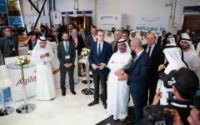Emirates Scientists Council, Mohammed Bin Rashid University Of Medicine And Health Sciences Sign Strategic Partnership
The Emirates Scientists Council (ESC) has announced a strategic partnership with the Mohammed bin Rashid University of Medicine and Health Sciences granting scientists and researchers direct access to the University’s advanced technologies, instruments, and ample scientific resources.
The partnership is in line with the objectives of the National Advanced Sciences Agenda 2031, which seeks to drive scientific research on a national scale and enrich scientific resources in vital sectors. It allows scientists to make use of the top scientific resources in the UAE’s leading universities and scientific research institutions, ensures continuity in research in the Emirates, and lays the foundations for an environment that supports scientific progress and the exchange of knowledge among experts and academic institutions.
Her Excellency Sarah bint Yousef Al Amiri, Minister of State for Advanced Sciences, said: “The UAE Government is committed to establishing an environment that embraces science as a main pillar of its future strategy, and believes in the importance of scientific output in proposing solutions for the challenges standing in the way of sustainable development.”
H.E. Al Amiri noted that that partnership with the Mohammed Bin Rashid University of Medicine and Health Sciences forms part of the OpenLabs platform. “It reflects our dedication to implementing the UAE leadership’s vision to localise research and create knowledge rather than simply receive it,” H.E. explained. “It also lays the groundwork for developing the scientific sector across the UAE, building partnerships, and enhancing cooperation among various entities and academic institutions to accomplish the objectives of the National Advanced Sciences Agenda 2031.”
An integrated Academic Health System
The partnership between the Emirates Scientists Council and the Mohammed bin Rashid University of Medicine and Health Sciences will be focusing on finding solutions for the challenges facing the healthcare sector.
“Our mission at the University is to advance health in the UAE and the region,” said Dr Amer Sharif, Vice Chancellor of the Mohammed Bin Rashid University of Medicine and Health Sciences. “To that end, we seek to build an integrated academic health system rooted in innovation and research. We are confident that the agreement we signed with the Emirates Scientists Council will significantly facilitate communication in healthcare, provide the sector with all necessary resources, and support passionate and innovative researchers from outside the university to tackle healthcare challenges.”
“Our laboratories will be made widely accessible thanks to the ‘OpenLabs’ platform, which helps accomplish the objectives and priorities of the National Advanced Sciences Agenda 2031,” Dr Sharif added.
‘OpenLabs’ Platform
“OpenLabs” is an initiative launched by the Emirates Scientists Council to establish an environment that support research and scientists as part of the National Advanced Sciences Agenda 2031. The initiative was launched by His Highness Sheikh Mohammed bin Rashid Al Maktoum, Vice President and Prime Minister of the UAE, Ruler of Dubai, in April 2018.
The Platform connects laboratories across the UAE with scientists and researchers to facilitate the production of knowledge; it also channels government investments towards specialised laboratories to improve their productivity. The ‘OpenLabs’ Platform is the largest conglomeration of research institutions in the UAE and seeks to promote advanced research, establish outstanding infrastructure and an integrated ecosystem, and advance scientific sectors in the Emirates, cutting research costs by 30%.
The Platform comprises more than 510 accurate and advanced scientific instruments in 10 of the most prominent research institutions in the UAE, namely: The Mohammed bin Rashid Space Centre; Khalifa University; United Arab Emirates University; American University of Sharjah; Abu Dhabi Department of Energy; International Centre for Biosaline Agriculture (ICBA); New York University – Abu Dhabi; Emirates Global Aluminium; Zayed University, and Abu Dhabi Polymers Company (Borouge).









